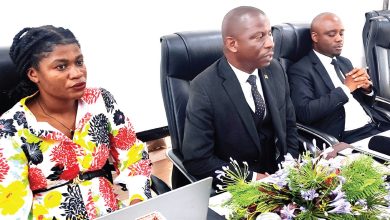USA faults Sattar case handling, other issues
The US has faulted Malawi for foot-dragging in prosecuting corruption cases linked to UK-based Malawian businessperson Zuneth Sattar.
In an exclusive interview with The Nation in Lilongwe on Wednesday, US Embassy Chief of Mission Amy Diaz also described as “out of the norm” the Malawi Supreme Court of Appeal ruling last Wednesday that barred the Anti-Corruption Bureau (ACB) from using evidence generated by the UK’s National Crimes Agency (NCA).
During the interview to be aired on Nation Online at 7pm tonight, she also justified the travel ban the US imposed on some suspects of corruption in Malawi as a “small measure of justice to Malawians”.

Malawi deserve better. | Nation
Diaz said the US has “overwhelming evidence” of corruption involving some officials who if they were tried in the US they would easily be convicted
“I mean quite frankly I believe wholeheartedly that the people of Malawi deserve more and they deserve accountability. I think the hardest part of my time here is watching Malawians grow poorer and that happens because of corruption,” she said.
On the Supreme Court ruling, she said blocking the use of NCA evidence was “out of the norm” and defeated the purpose of collaboration between and among nations on investigation and intelligence.
Said Diaz: “The Government of Malawi needs cooperation. We share information and if we believe an American is doing something illegal concerning Malawi, the first step is to share information.
“Similarly, we expect the Government of Malawi to do the same if they have information they can share with American agencies. It is quite a norm for countries to share information.
“So, I think for the court to make this decision they are not really following most international practices. But more importantly, it is a signal about the seriousness which the courts and the State attach to this case. People ought to be held accountable. If it doesn’t happen, this high level of impunity will exist and continue to exist in Malawi which will only make Malawians poorer.”
In the case, former minister of Lands Kezzie Msukwa and businessperson Ashok Kumar, an associate of Sattar, appealed against the High Court of Malawi decision to allow the ACB to use evidence sourced from the NCA.
Delivering the ruling last week, a nine-judge Supreme Court panel that included Chief Justice Rizine Mzikamanda said procedurally ACB was supposed to engage the NCA through the Attorney General (AG) as per the Mutual Legal Assistance Act and on that basis the bureau cannot use this evidence.
Diaz said upon noticing the lack of interest from Malawi to hold the ‘corrupt’ accountable, the US government decided to issue travel ban against four suspects and their families last year.
The four are former solicitor general and ACB chief Reyneck Matemba, former Public Procurement and Disposal of Assets Authority board chairperson John Suzi-Banda, former Malawi Police Service lawyer Mwabi Kaluba and ex-Inspector General of the Malawi Police Service George Kainja.
Asked why the US made the decision when the four are supposed to enjoy the presumption of innocence until proven guilty, Diaz said it was based on the amount of available evidence.
But commenting on the sentiments in a written response, Catholic University of Malawi dean of law James Kaphale said he did not agree with the US envoy’s position on the court’s decision because the ACB, as a law enforcement agency, ought to learn to follow procedure.
He said: “The decision in the Kezzie Msukwa and Ashok Nair case gave guidance on the procedure that the ACB should follow if they want to collect foreign jurisdiction evidence in that they have to go through the office of the Attorney General in order for that evidence to be admissible.
“If ACB can follow that procedure, the evidence will be admitted in the courts in Malawi”.
Malawi Law Society (MLS) president Davis Njobvu said they cannot competently weigh in on the matter in the absence of the written judgement of the court.
He said: “It is difficult for the MLS to make a comment without a study of the actual cases, when they were started and what has transpired so far and if there are delays, who is behind the same.
“What we will do, however, in view of those allegations is to monitor these cases to assess progress and ensure that the processes remain fair and neutral in pursuit of our public interest mandate.”
The ACB is on record as having told a commission of inquiry into circumstances that led to the arrest of its immediate-past director Martha Chizuma that the bureau submitted a request to the Attorney General who did not grant them their wish.
ACB acting director general Hilary Chilomba has not responded to our inquiry while Ministry of Justice spokesperson Frank Namangale refused to comment.
On the other hand, Judiciary spokesperson Ruth Mputeni promised to respond, but had not done so by press time at 9pm.





